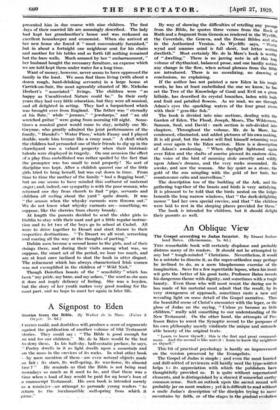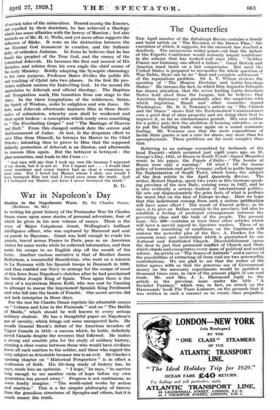An Oblique View
The Gospel according to Judas Iscariot. By Ernest Suther. land Bates. (Heinemann. is. tkl.) Tins remarkable. book will certainly displease and probably distress many of its readers. It should not be attempted by any but " tough-minded " Christians. Nevertheless, it would be a mistake to dismiss it, as the super-orthodox may perhaps be inclined to do, as a mere blasphemous exercise of the imagination. Save for a few regrettable lapses, when his ironic wit gets the better of his good taste, Professor Bates invests his dangerous theme with dignity, and sometimes with a tragic beauty. Even those who will most resent the daring use he has made of his material must admit that the result, by its very strangeness of approach, sometimes casts a new and revealing light on some detail of the Gospel narrative. Thus the beautiful scene of Christ's encounter with the leper, or the gloss of Judas on the saying, " Unless ye become as little children," really add something to our understanding of the New Testament. On the other hand, the attempts of Pro- fessor Bates to wrest the Synoptic record to the purposes of his own philosophy merely vindicate the unique and untouch- able beauty of the original texts. , " Learn to know thyself ; this is the first and great command- ment. And the second is like unto it : learn to know thy neighbour as thyself:"
This bit of practical psychology is hardly an improvement on the version preserved by the Evangelists.
The' Gospel of Judas is simple ; and even the most hurried and dull-witted of reviewers will hardly need the type,writtei helps t3' its appreciation with which the publishers have thoughtfully provided us. It is quite without supernatural elements, and is distinguished by a shrewd if somewhat earthy common sense. Such mi outlook apon the sacred record will probably jar on most readers ; yet it is difficult to read without a smile Judas's description of-the disciples trying to 'move mountains by faith; or of the stages in the gradual evolution of certain tales of-the Miraculous. Reared among the Esseites, but repelled by their doctrines, he has achieved a theology whieh has some affinities with the heresy of liareion ; but also wonads us of Mr. H. G. Wells, and yet more often suggests the influence of Blake. • It rests on the distinction between the one Eternal God immanent in creation, and the Sultanic deity of orthodox Judaism. In 'Jestis he believes that he has iound the Prophet of the. True God, and the enemy of the
tyrannical Jehovah. He becomes the first and nearest of His lisciples, and relates from his own angle the chief scenes of the early Ministry. Boldly adapting the Synoptic chronology
to his own purpose, Professor Bates • diVides the ptiblic life mid tuaelfM' g of Christ into two phases. In the first He pro- ...jahnuyfAtheut suceess the Indwelling God. In the second He mpitulates to 'Jehovah and official theology. The Baptism and Teniptstion roark,His transition from one stage to the ether. In the three teroptations of the wildernesa, Satan, the Spirit of Wisdoin, seeki to enlighten and win Jesus. He fails, and Jehovah afterwards instructs Him in those Beati- tudes of submission, whereby men shall be weakened and their spirit broken—a conception which surely owes something to " The-Everlasting .GOspel " and " The Marriage of Heaven and Hell." From this changed outlook date the sorrow and lisillusionment of Judas. • At last, in the desperate effort to save Him from Himself, he betrays his Master to the Chief
Priests ; intending thus to prove to Him that the supposed fatherly protection of Jehovah is an illusion, and afterwards to ransom Him again. But the betrayer is betrayed : the plan miscarries, and leads to the Cross :—
" And men will say that I took my own life because I repented of my deeds, but it is not so. For I repent not . . I would that every murderer and every traitor had as clear a conscience as mine own. For I loved my Master whom slew, nor would I have betrayed Him but that I loved even more the truth. And if I betrayed my Master,. yet have I never betrayed the truth."
• E. U.









































 Previous page
Previous page